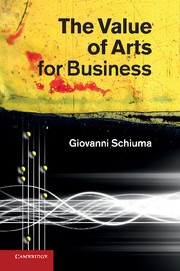Book contents
- Frontmatter
- Contents
- List of figures
- List of boxes
- Acknowledgements
- Foreword
- Introduction
- 1 Why arts matter in management
- 2 The arts into action: Arts-based Initiatives
- 3 The value of Arts-based Initiatives in business
- 4 Arts-based Initiatives and business performance
- 5 Managing Arts-based Initiatives to improve business performance
- A closing remark
- Appendix
- Notes
- References
- Index
Appendix
Published online by Cambridge University Press: 05 July 2011
- Frontmatter
- Contents
- List of figures
- List of boxes
- Acknowledgements
- Foreword
- Introduction
- 1 Why arts matter in management
- 2 The arts into action: Arts-based Initiatives
- 3 The value of Arts-based Initiatives in business
- 4 Arts-based Initiatives and business performance
- 5 Managing Arts-based Initiatives to improve business performance
- A closing remark
- Appendix
- Notes
- References
- Index
Summary
A fundamental hypothesis underlying the arguments of this book is that human knowledge is the result of a synergetic integration of two minds: the rational and the emotive mind. Although they can play a different role in human decision-making and actions, the recognition of their existence is a central issue to point out that emotions have a great relevance in shaping and affecting people and organisational life and activities.
In the last decade, many disciplines have highlighted that human mental life is affected by two semi-independent faculties related to emotive and rational abilities. As a consequence, two different minds can be recognised: the ‘rational mind’ and the ‘emotive mind’ (Ekman, 1992; Ekman and Davidson, 1994; Epstein, 1994). They affect people's behaviour, with the first driving thinking abilities, and the second influencing feelings. They represent two different ways of knowing that are strictly interwoven and functionally interrelated, together continuously interacting to construct individual reality. The two minds operate in close harmony, guiding one's ability to make sense of the world and take decisions, as well as to perform tasks. The rational and emotive minds usually operate in a coordinated manner, with feelings supporting the functioning mechanisms of the thinking mind, and the rational mind controlling the dynamics of emotions.
- Type
- Chapter
- Information
- The Value of Arts for Business , pp. 252 - 255Publisher: Cambridge University PressPrint publication year: 2011



